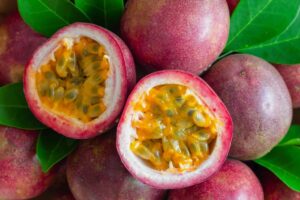Description
Botanical Name: Passiflora incarnata L.
Other Names: passion flowers or passion vines

Passion flower (Passiflora incarnata) is a climbing vine adorned with white and purple flowers, and its chemical constituents are known to induce a calming effect.
Passion flower has a historical tradition of use in the Americas and later in Europe as a soothing herb for conditions such as anxiety, insomnia, seizures, and hysteria. Today, it continues to be utilized for the treatment of anxiety and insomnia.
This passion fruit pulp powder is 100% fruit, no sugar or anything else added. You can use it for ganache, making juice (just add water), fillings, ice pops, or any other culinary delights.
The slightly tart notes and pale yellow colour make it great foricing or drizzling on cakes. It is a natural for juices and smoothies as its taste is very refreshing. In savoury dishes it could be used combined with ginger to make a sweet/savoury sauce for chicken, and works well in marinades for prawns or scallops.
Passion Flower :
Passionflower (Passiflora incarnata), a climbing vine with calming properties, is traditionally used to reduce anxiety, improve sleep, and ease pain, and is also used in foods and beverages for flavoring.
Traditional and Modern Uses:
Anxiety and Insomnia:
Passionflower is known for its calming and sedative properties, which have led to its use as a natural remedy for anxiety, stress, and insomnia.
Pain Relief:
Some people use passionflower to alleviate pain, including muscle cramps and headaches.
Skin Conditions:
Passionflower extracts are sometimes applied topically to treat hemorrhoids, burns, and swelling.
Other Traditional Uses:
Historically, passionflower has been used for various conditions, including seizures, asthma, and symptoms of menopause.
Food and Beverage Flavoring:
Passionflower extract is used as a flavoring agent in some foods and beverages.
Potential Health Benefits:
Anxiety Reduction:
Studies suggest that passionflower may help reduce symptoms of anxiety, potentially working as effectively as some prescription medications.
Improved Sleep:
It is believed that passionflower can modestly improve the total amount of time spent asleep, making it a potential aid for insomnia.
Reduced Anxiety Before Surgery:
Passionflower may help reduce anxiety before surgery, with some studies showing it to be as effective as other treatments like melatonin or midazolam.
Anti-inflammatory Properties:
Passionflower contains compounds with anti-inflammatory properties, which may help in managing chronic pain.
Cardiovascular Health:
Some research suggests that passionflower may help regulate blood pressure and heart rate, potentially benefiting cardiovascular health.
Antioxidant Effects:
Passionflower contains antioxidants that may help protect cells from damage caused by free radicals.
May help with ADHD symptoms
Early research indicates that taking passion flowers orally for eight weeks may help some ADHD symptoms in kids aged 6 to 13 years.
May help with menopause symptoms
Passionflower has been linked to various cardiovascular benefits, including the reduction of high blood pressure. Its calming properties help to lower stress and anxiety, which are significant contributors to heart disease.
Passion fruit :
Passion fruit, a tropical fruit, offers various uses and benefits, including boosting immunity, aiding digestion, and potentially supporting heart health, skin health, and bone health, due to its rich content of vitamins, minerals, and antioxidants.
Nutritional Value & Benefits:
Rich in Vitamins and Minerals:
Passion fruit is a good source of vitamins A and C, as well as minerals like potassium, iron, and magnesium.
Antioxidant Powerhouse:
It’s packed with antioxidants, including vitamin C and beta-carotene, which help protect the body against damage from free radicals.
Fiber Content:
Passion fruit is a good source of dietary fiber, which aids in digestion, promotes gut health, and can contribute to satiety.
Potential for Heart Health:
The potassium in passion fruit can help regulate blood pressure, supporting cardiovascular health.
Immune System Support:
Vitamin C and other antioxidants in passion fruit can boost the immune system, helping the body fight off infections.
Skin Health:
Vitamin C and other antioxidants can contribute to healthy, glowing skin by promoting collagen production and reducing free radical damage.
Bone Health:
Minerals like magnesium, calcium, and phosphorus in passion fruit can contribute to strong and healthy bones.
Uses:
Culinary Uses:
Passion fruit can be eaten fresh, added to smoothies, desserts, yogurts, or used to make juices, sauces, and jams.
Beverage Ingredient:
Passion fruit juice is a popular beverage, and the fruit can also be used to flavor other drinks.
Cosmetic Applications:
The fruit’s antioxidants and hydrating properties make it a potential ingredient in skincare products.
Medicinal Applications:
Some traditional uses include using the fruit or its flowers for calming, sleep-inducing, and muscle spasm relieving effects.
Passionflower Root:
Passionflower root, primarily from Passiflora incarnata, has been traditionally used as a calming herb for anxiety, insomnia, and other conditions, and is still used today as a dietary supplement for similar purposes.
Traditional and Modern Uses:
Anxiety and Insomnia:
Passionflower is known for its calming properties and is used to treat anxiety and insomnia.
Preoperative Anxiety:
It can help reduce anxiety before surgery, with some studies showing it’s as effective as certain medications.
Other potential uses:
Pain Relief: Some believe it may help with certain forms of pain.
Menopausal Symptoms: It’s sometimes used to address menopausal symptoms.
Attention-Deficit Hyperactivity Disorder (ADHD): Some studies suggest potential benefits for ADHD.
Hemorrhoids: Topical application may help with hemorrhoids.
Traditional Uses:
Native American and European Folk Medicine: Passionflower has a history of use in traditional medicine, particularly in North America and Europe, for its calming and sedative effects.
Poultice: The Cherokee people use the roots as a poultice to draw out inflammation in thorn wounds.
Earache: A tea of the root is used for earache.
Weaning Infants: Tea of the root is used to wean infants.
Blood Tonic: The Houma people infuse the roots as a blood tonic.
Botanical Name: Passiflora incarnata L.
Other Names: passion flowers or passion vines
Reviews
There are no reviews yet.